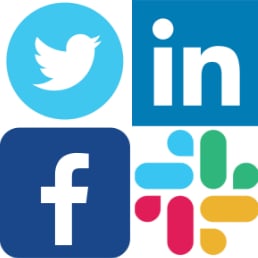...
How would you like to be a Guest Blogger for KMI? Email us at: info@kminstitute.org and let us know your topic(s)!
Microsoft buys LinkedIn for $26bn - What does this tell us about the value of Human Capital and Social networks?
So the truth is out - paradoxically in an age of digital transformation, human capital is becoming the great differentiator. Microsoft’s eye watering price paid for LinkedIn makes the argument for the increasing value of Human Capital and Social Networks. Indeed the case is even more compelling when you understand that LinkedIn is still a loss making company.
Why did Microsoft buy LinkedIn?
No-one knows exactly how Microsoft will recover their $ investment (if at all) and to focus on that aspect is to miss the point. As we move at speed towards a cloud computing default setting with a proliferation of inexpensive personalised apps that drive our private and public needs, the role of software providers (as was the case with hardware providers in the previous decade) is diminishing. The next generation really do not care about Microsoft’s traditional product set and they will find ways to get its software for free if they really have to use it. More importantly the value that we are creating in terms of Human Capital is not captured by traditional software; it resides in our digital profiles and digital interactions. So Microsoft has a paid a purchase price that it thinks is the going rate for a seat at the Social Knowledge Management table (a table that Yammer and SharePoint has clearly not delivered for them to date).
LinkedIn vs Yammer
This raises an interesting question - what is the difference between a Yammer platform and LinkedIn? Well in terms of platform capability the differences are marginal, can be copied and created in either and so are not worth talking about. BUT in terms of human capital the differences are significant. LinkedIn is like a buzzing industry party where people are sharing and interacting in all sorts of ways. And bizarrely people keep arriving and joining either with or without an invite. New people, virtual strangers as it were, (often unsolicited)seek you out. It is the business clichéd ‘networking event’ on steroids. Yammer (and other collaborative platforms) by contrast are merely meeting rooms for hire which may or may not lead to successful company interaction and collaboration but will always be dependent on getting people to join and to participate. Sustaining interaction in these platforms is much more difficult as the participant selection set is more restricted by virtue of the business model. Let me explain; I go to LinkedIn to share my business value as an individual in all my business incarnations and leveraging all my business skills over time. I go to Yammer to lend my expertise (or enthusiasm) to a predefined subject of interest which inevitably has a limited shelf life and then I leave. When you look at it this way the price paid by Microsoft for something that is not easily replicated does not seem quite so preposterous.
However the jury is still out as to whether the mere presence of Microsoft in the room is a sufficient turn off for people to migrate to another place that is more in tune with their needs. It is like when someone who doesn’t really fit in arrives at a fun party (usually they are too old, they look like someone’s Mum or Dad) and suddenly you just don’t want to be there. At the moment my kids are happy to be on LinkedIn with me but I’m not sure that will remain so. Still LinkedIn has a strong brand and high user loyalty so they might be able to preserve that even with the takeover. That said, in a strange case of life initiating art, as I am writing this post, someone has invited me to a network called branded.me which looks like a direct competitor to LinkedIn and invites you to import your LinkedIn network (which I am not happy to do!).
The way forward
For me the corporate future still lies with Enterprise Social Networks over a generic business collaboration spaces like LinkedIn, What’s App or Facebook for work. But the key to this future is in not trying to compete with those social spaces but rather creating a different space that presents the company story over time. If LinkedIn traces the story of you the user in your business incarnation, a really good ESN should provide the story of the company as it grows, develops and diversifies. It should make available the knowledge, insights and expertise of all its employees past and present. Not in dry and impenetrable knowledge repositories but rather through well managed, engaging and intelligently curated knowledge communities. It should be the go to place for continuous learning - leveraging multi-media from blogs, wikis, mobile apps through to the company YouTube channel. And covering everything from ‘how to’ videos to Knowledge Cafes. It should be the place where employees can self-serve and where they have a voice. The place where they can manage their progression through the company. And the place where trusted partners and loyal supportive customers can be part of a collaborative decision making process on the company strategy. This is what employees, partners, and customers want, this is what Social Knowledge Management focuses on and this is not what LinkedIn is well placed to do.
About the author:
 Rooven Pakkiri is a Social Knowledge Management consultant and Digital Evangelist. A veteran of the dot.com era; he is particularly interested in the points where Society, Technology and Business intersect and the paradigm shifts that occur whenever this happens.
Rooven Pakkiri is a Social Knowledge Management consultant and Digital Evangelist. A veteran of the dot.com era; he is particularly interested in the points where Society, Technology and Business intersect and the paradigm shifts that occur whenever this happens.
Approach:
In terms of his consultancy style and approach, Rooven likes to describe himself as a digital version of a ‘Saville Row’ tailor. He is completely client focused in his approach and technology agnostic.
Next Course:
Join Rooven and KMI at our next Social KM course in London, September 7-8, where Rooven will cover in detail the points above and help you to develop your own Social KM roadmap.
Archives
- April 2024 (4)
- March 2024 (4)
- February 2024 (4)
- January 2024 (3)
- December 2023 (2)
- November 2023 (2)
- October 2023 (3)
- September 2023 (3)
- August 2023 (6)
- July 2023 (4)













